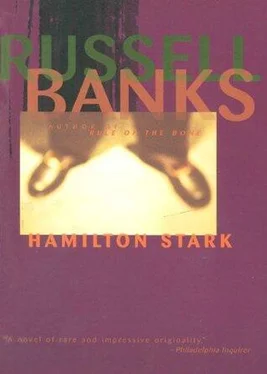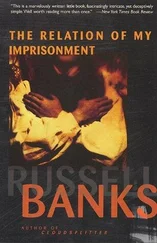“Did he do that because he was carried away with enthusiasm for Benson’s speech?” Her voice was shaky, frightened, pleading.
“Oh, God, I don’t know. I just don’t know anymore. But he has a way,” I explained, “as you probably know all too well, of praising a thing by condemning it and of condemning a thing by praising it. He has a way of making a positive statement from a double negative, and a negative statement from a double positive. The first skill is not rare, but the second is. You aren’t a native New Englander, as I am and as your father is, so you’re probably not as aware as I of the degree to which the skill operates in the culture as a means for self-expression. Practically any old Yankee farmer will let you know how cruel and relentless his winter has been, not by condemning it, but by smiling and perversely praising the facts that his thermometer has frozen, that his cattle and pigs all froze to death in January, that there was still ice on the lakes in mid-June. It’s almost an ironic point of view, an extremely highly developed form of sarcasm that they’re not even aware they possess. The late Latin poets possessed it, consciously, of course, and certain eighteenth-century English authors owned it also, again quite consciously. But rarely, if ever, has it been characteristic of an entire people. Hamilton, your father, seems to have developed it to an extremely high degree, mainly because at some early age he must have become conscious of it and realized that, if he pushed it to a still more extreme point, he could gain a much wider range of reference for it, could use it to criticize matters more complex than last winter’s awful weather. At least that’s my theory, Rochelle. And because I love the man, I choose to believe it. So I guess it’s more than a theory, it’s also a rationalization. I wish it were more than a rationalization, though. I wish it were a description.”
“I know,” she said softly, in almost a whisper. “If it were a description, you could believe that he despised Ezra Taft Benson, had utterly rejected him, and yet had managed at the same time to avoid subscribing to your and my liberal notions. Wouldn’t that be a profound and mature politics?” she said in a voice filled with wonder. “To be free to criticize and even to despise the old man’s reactionary position without, as a result, having to endorse any other. To offer yourself essentially as a critique , to be able to trust yourself that much! Why, you’d have to be a political genius to accomplish it!” she exclaimed. “Or some kind of Kierkegaardian ironist,” she added thoughtfully.
“That’s precisely what keeps me from deserting your father’s side at moments like that, like the time he shouted the state motto at Benson or when he fell asleep during your valedictory speech or mocked me for voting for people like Morris Udall … or all the other things he’s done that, on the surface, seemed mindless, cruel or intolerant.” Our enthusiasm for the man was growing again. Our fear and mistrust were on the wane. With bright eyes and rapid words we cheered each other on, and before long we were both loving and admiring him without qualification again.
It was more than merely possible that he had intended all this, had even foreseen it, and that it was his method of teaching us to see and understand the world more independently and with steadily increasing clarity. He was in many ways like a Sufi master or a wizened old peyote-chewing Indian shaman or a Zen Buddhist teacher who by indirection points direction out. But we are so naïve and ill-formed that, in our search for wisdom, we run around expecting to find it only in stereotypical figures — like desert-browned Sufis or raucous old Indian grandfathers or crisp Buddhist monks — never realizing that it is more in the nature of true wisdom that, for us, wisdom reside in the familiar form of a New Hampshire pipefitter who can’t seem to get along with people.
Reaching over, I took her by her smooth shoulders, pulled her to me, and felt her cool breasts press against my chest. “Oh, Rochelle!” I cried. “We must be strong! And I do believe that we’re stronger together than we are alone! Your father is probably the greatest man either of us will ever have the good luck to meet in our lifetimes. Alone we weaken, we forget how difficult and tangled is the path to true wisdom. But together we are strengthened, toughened, encouraged to push through the intellectual and emotional tangles and our own most private fears and insecurities and conditionings to the end, where we, too, can offer ourselves as critiques, as double positives, and finally, in the largest sense, as human beings!”
Needless to say, I was hovering somewhere between ecstasy and hysteria when suddenly, and thankfully, Rochelle taught me the utter ridiculousness of my feelings, showed me how far I still had to go before I could claim to possess a shred of the cloth Hamilton wore. She showed me also how much further along that path she had gone than I, showed me that while I might have glimpsed the master’s garment, she had actually touched it.
“I don’t think you understand the nature of religious experience,” she said evenly. “I’m sorry, but when a person reaches the point where he or she can claim to know what you are now claiming to know, he or she should be free to enact it. If he or she can’t, if he or she still needs help, then he or she really cannot say that he or she has the requisite knowledge. I’m sorry, but you’re much closer to the path when you’re greedily interrogating me about my father, when you’re splicing together your own personal and acquired knowledge of him, making of the man’s life a text, if you will, that will guide you straightway into the invention of your own life.” Gently, she pulled away from me and took a last sip from her glass. Then she smiled. “If you’ll fix me another drink, I’ll tell you how my father almost went to college.”
“What?” I was stupefied by the sequence — first a collusion, then a collision, and now a collusion again.
“Sure,” she said brightly. “I’ll tell you everything I know about him. And it’s quite a lot. I’ve done four years of research on his life so far, for that ‘novel’ of mine. You know, The Plumber’s Apprentice . I don’t feel possessive about that material anymore. I’m no more a professional novelist than you are, for heaven’s sake!” she laughed, and I had to laugh with her. “Go ahead, honey, fix me another drink and I’ll tell you all about how my daddy almost went to college.” She smiled and spoke with a southern accent that, as I rushed across the bedroom to the dresser where I had placed the cognac, soda and ice, nearly made me swoon.
“After all, honey,” she drawled from the bed, “you told me something this mo’ning I didn’t know about before, that stuff about how Daddy stood up and shouted the state motto and all? I oughta do the same thing for you now, shouldn’t I?” And she winked at me. Winked! What a woman!
I was certainly very confused. How, how had I lost control of the situation like this?
Then I remembered: it was the ecstasy and the hysteria — or rather, it was my having reached the point halfway between the two. After that, everything had gone haywire for me. Rochelle had taken complete control of the conversation, and of me, until there I was fetching her a drink in exchange for a tale I hadn’t even particularly wanted to hear anymore, and to make matters worse, I was doing it in a swoon. How would I ever be able to remember the tale, let alone determine its importance to my own tale? Oh, reader, dear reader, remember this, and let it be an example to you. In the book of your life, never permit yourself to invent a woman or a man who is capable of bewildering you while he or she seduces you. You will lose the thread of your argument, you will find your story line impossibly tangled, your plot utterly overthrown, and your faith in your powers of observation and analysis sliced to limp ribbons of insecurity. Call it love, call it whatever you will, but know the risk. If you must, as I must, think of your life as a novel and of the creatures therein as “characters,” then unless you keep yourself from falling in love with one of those creatures, you will have to give up the idea of control. You will have to become not an inspired author, but one who is simply not in control of his own novel. It happens, it happens frequently.
Читать дальше












